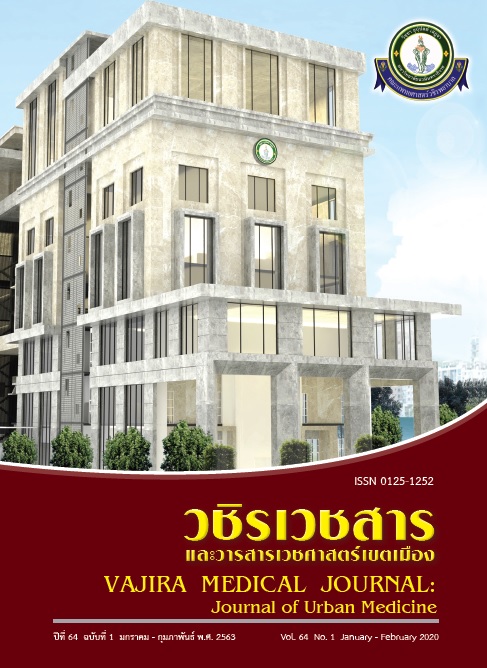Work Factors related to Sleep Quality among Professional Nurses in the Inpatient Department, Faculty of Medicine Vajira Hospital
Main Article Content
Abstract
Objective: To study sleep quality and work factors that affect sleep quality in professional nurses working in the inpatient units of Faculty of Medicine, Vajira Hospital.
Methods: The cross-sectional descriptive study was conducted in 345 inpatient professional nurses at the Faculty of Medicine, Vajira Hospital. The instruments were composed of personal information, sleep hygiene index, work factors and Thai version of the Pittsburgh sleep quality index (T-PSQI). Statistical analysis included descriptive analysis, Chi-square test, Fisher’s exact test and multiple logistic regression.
Results: Most of 345 inpatient professional nurses, mean age (X ± S.D.) was 34.8 ± 10.4 years. Over all sleep hygiene was low with sleep hygiene index score (X ± S.D.) at 2.1 ± 0.3. The total of 295 (85.5 %) reported low sleep quality with mean score of T-PQRS (X ± S.D.) at 8.6 ± 4.3. Significant predictive factors of low sleep quality were age younger than 25, 25-35 and 36-45 years old (ORadj = 3.53, 95%CI: 1.17-10.61, ORadj = 9.72, 95%CI: 3.54-26.70 and ORadj = 3.35, 95%CI: 1.31-8.54), lack of exercise (ORadj = 2.29, 95%CI: 1.15-4.56), having 1-10 morning shifts per months (ORadj = 6.81, 95%CI: 2.31-20.06), 1-6 morning shifts per months (ORadj = 8.84, 95%CI: 1.33-58.95) and viewing amount of work load as moderate or high (ORadj = 2.97, 95%CI: 1.18-7.44 and ORadj = 14.96, 95%CI: 3.92-57.21).
Conclusion: Most of the inpatient professional nurses at the Faculty of Medicine, Vajira Hospital had low sleep quality and low sleep hygiene. Thus, it is highly recommended that hospital administrators should implement policies regarding improvement of sleep quality and sleep hygiene, encouraging regular exercise and arranging more optimal work schedule, particularly the amount of morning and night shift.
Downloads
Article Details
References
Sleep and sleep disorders [internet]. USA: Centers for Disease Control and Prevention; 2018 [cited 2018 Oct 15]. Available from: http://www.cdc.gov/sleep/about_us.htm.
Tanchaisawat W. Sleep physiology. In: Sleep and sleep disorders. Faculty of Medicine, Prince of Songkla University, editor. Songkla: Prince of Songkla University; 1993. p.14-35.
Chaiarj S, Panya P. Insomnia and related factors. The Thai Journal of Nursing Council 2548;20(2):1-12.
Effects of sleep deprivation [internet]. Thailand: Bangkok Hospital; 2015 [cited 2018 Oct 15]. Available from: https://www.bangkokhospital.com/index.php/th/diseases-treatment/the-effects-ofsleep-deprivation.
Buysse DJ, Reynolds CF, Monk TH, Berman SR, Kupfer DJ. The Pittsburgh sleep quality index: a new instrument for psychiatric practice and research. Psychiatry Res 1989;28(2):193-213.
Rojjanakitti P. Relationships between personal factors, environmental factors and sleep quality in surgical patients after operation [dissertation]. Bangkok: Chulalongkorn University; 2001.
Jirapramukpitak T, Tanchaiswad W. Sleep disturbances among nurses of Songklanagarind Hospital. J Med Assoc Thai 1994;42:122-31.
Reangsing C, Lalitanantpong D. Quality of sleep and mental health of professional nurses in government hospitals Bangkok Metropolis. Chula Med J 2008;52(suppl):s.71-85.
Yodchai K, Oumtanee A, Chinnawong T. Factor for predicting and the quality of sleep as perceived by nurses in southern regional hospitals and medical centers. J Med Songkla 2007; 25:408-13.
Chanamanee P, Taboonpong S, Intanon T. Sleep quality and related factors among university students in southern Thailand. Songkla Med J 2006;24(3):163-73.
Kosol S. A Sleep quality of health personnel in Mahidol University [dissertation]. Bangkok: Mahidol University; 1995.
Tupsangsee J, Jiamjarasrangsi W, Tangwongchai S. Quality of sleep among intensive care unit nurses in Thailand. Chula Med J 2008;52(6):465-75.
Udomrat P. Sleeping disorders from work shift. In: Sleep and sleep disorders. Faculty of Medicine, Prince of Songkla University, editor. Songkla: Prince of Songkla University; 1993. p.93-112.
Winwood PC, Lushington K. Disentangling the effects of psychological and physical workdemands on sleep, recovery and maladaptive chronic stress outcomes within a large sample of Australian Nurses. J Adv Nurs 2006;56(6): 679-89.
Vittinghoff E, McCulloch CE. Relaxing the rule of ten events per variable in logistic and Cox regression. Am J Epidemiol 2007;165(6):710-8.
Peduzzi P, Concato J, Kemper E, Holford TR, Feinstein AR. A simulation study of the number of events per variable in logistic regression analysis. J Clin Epidemiol 1996;49(12):1373-9.
Kaewpang P, Jitpanya C. Selected factors related to insomnia in adult cancer patients. Journal of Nursing Science Chulalongkorn University 2006;18(2):33-47.
Sitasuwan T, Bussaratid S, Ruttanaumpawan P, Chotinaiwattarakul W. Reliability and validity of the Thai version of the Pittsburgh sleep quality index. J Med Assoc Thai 2014;97(3):57-67.
Yamma C, Lueboonthavatchai P. Sleep problems, fatigue and work efficiency among registered nurse at King Chulalongkorn Memorial Hospital. J Psychiatr Assoc Thailand 2013; 58(2):183-96.
McDowall K, Murphy E, Anderson K. The impact of shift work on sleep quality among nurses. Occup Med (Lond) 2017;67(8):621-5. doi: 10.1093/occmed/kqx152.
Squire L, Berg D, Bloom F, duLac, S, Ghosh A, Spitzer N. Fundamental neuroscience. 3rd ed. London:Elsevier;2008.
Lee KA. An overview of sleep and common sleep problems. ANNA J 1997;24(6):614-23.
Buathong N. Quality of sleep and mental health among cabin attendants in Thai Airways International Public Company Limited [dissertation]. Bangkok: Chulalongkorn University; 2007.
Rakim W, Taboonpong S, Chailungka P, Juthong S. Sleep quality, factors interfering with sleep, and intervention activities among patients receiving mechanical ventilation. Songkla Med J 2006;24(4):289-98.
Tarhan M, Aydin A, Ersoy E, Dalar L. The sleep quality of nurses and its influencing factors. Eurasian J Pulmonol 2018;20:78-84.
Supagun P. Experience of work stress management of head nurses [dissertation]. Bangkok: Chulalongkorn University; 2005.
Uchida S, Shioda K, Morita Y, Kubota C, Ganeko M, Takeda N. Exercise effects on sleep physiology. Front Neurol 2012;3:48. doi:10.3389/fneur.2012.00048.
Tanaka H, Taira K, Arakawa M, Toguti H, Urasaki C,Yamamoto Y, et al. Effect of short nap and exercise on elderly people having difficulty in sleeping. Psychology and Clinical neurosciences 2001;55:173-4.
Mindell JA, Meltzer LJ, Carskadon MA, Chervin RD. Developmental aspects of sleep hygiene: findings from the 2004 National Sleep Foundation Sleep in America Poll. Sleep Med 2009;10(7):771-9.
Gordon NP, Cleary PD, Parker CE, Czeisler CA. The prevalence and health impact of shiftwork. Am J Public Health 1986;76(10):1225-8.


